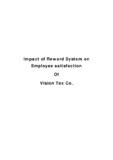| dc.contributor.advisor | Chowdhury, Hasan Maksud | |
| dc.contributor.author | Rafia, Sawline Sabnam | |
| dc.date.accessioned | 2018-02-01T08:01:15Z | |
| dc.date.available | 2018-02-01T08:01:15Z | |
| dc.date.copyright | 2016 | |
| dc.date.issued | 2016-12-18 | |
| dc.identifier.other | ID 13264014 | |
| dc.identifier.uri | http://hdl.handle.net/10361/9337 | |
| dc.description | This internship report is submitted in a partial fulfilment of the requirements for the degree of Masters of Business Administration, 2016. | en_US |
| dc.description | Cataloged from PDF version of internship report. | |
| dc.description | Includes bibliographical references (page 32). | |
| dc.description.abstract | Increasingly, organizations are realizing that they have to establish an equitable balance between the employee’s contribution to the organization and the organization’s contribution to the employee. Establishing this balance is one of the main reasons to reward employees. Organizations that follow a strategic approach to creating this balance focus on the three main components of a reward system, which includes, compensation, reward and recognition. Studies that have been conducted on the topic indicates that the most common problem in organizations today is that they miss the important component of Reward, which is the low-cost, high-return ingredient to a well-balanced reward system. A key focus of recognition is to make employees feel satisfied and valued. Research has proven that employees who get recognized tend to have higher self-esteem, more confidence, more willingness to take on new work and more eagerness to be innovative. The aim of this study is to investigate whether rewards and recognition has an impact on employee motivation. A biographical and Work Motivation Questionnaire was administered to respondents. The results also revealed that staff, and employees from non-white racial backgrounds experienced lower levels of rewards, and motivation. Future research on the latter issues could yield interesting insights into the different factors that motivate employees. My report may not sufficient. I have some limitations such as inaccurate search, insufficient time and the lack of experience. | en_US |
| dc.description.statementofresponsibility | Sawline Sabnam Rafia | |
| dc.format.extent | 32 pages | |
| dc.language.iso | en | en_US |
| dc.publisher | BRAC University | en_US |
| dc.rights | BRAC University Internship reports are protected by copyright. They may be viewed from this source for any purpose, but reproduction or distribution in any format is prohibited without written permission. | |
| dc.subject | Employee satisfaction | en_US |
| dc.subject | Vision Tex Company | en_US |
| dc.subject | Reward system | en_US |
| dc.title | Impact of reward system on employee satisfaction of Vision Tex Co. | en_US |
| dc.type | Internship report | en_US |
| dc.contributor.department | BRAC Business School, BRAC University | |
| dc.description.degree | M. Business Administration | |

